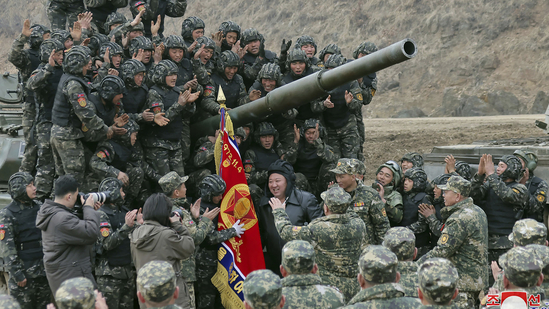North Korea Deploys More Troops to Russia Amid Heavy Losses
International International NewsPosted by NewAdmin on 2025-02-27 09:02:53 |
Share: Facebook | Twitter | Whatsapp | Linkedin Visits: 24

South Korea’s National Intelligence Service (NIS) has reported that North Korea has deployed additional troops to Russia to support its war in Ukraine. The NIS is currently assessing the exact number of soldiers sent, but estimates suggest that between 1,000 and 3,000 troops were transported to Russia’s Kursk region via cargo ships and military planes between January and February. This marks the second round of such deployments.
Earlier assessments indicated that around 11,000 North Korean soldiers had been deployed to Russia last year, with reports stating that approximately 4,000 of them had been killed or injured. In January, the NIS estimated that about 300 North Korean troops had died, while 2,700 others were wounded. Due to heavy losses, the troops were absent from combat since mid-January, but recent intelligence indicates they have been redeployed to the frontlines in early February.
Ukraine’s military has noted that North Korean troops had not been observed in combat for weeks, likely due to their withdrawal following significant casualties. Defense analysts suggest that these troops, lacking combat experience and facing communication barriers with Russian forces, have been particularly vulnerable to Ukrainian attacks. Reports also suggest that Russian forces have used North Korean soldiers in frontline assaults and have even ordered them to take their own lives rather than be captured.
While Moscow and Pyongyang have not officially confirmed these deployments, military cooperation between the two nations has increased since the Russia-Ukraine war began in February 2022. In November, Russian President Vladimir Putin and North Korean leader Kim Jong Un signed a bilateral treaty, which includes a mutual defense clause, pledging military assistance if either country faces external aggression.The ongoing collaboration between Russia and North Korea raises concerns about the extent of their military alliance and the potential implications for the war in Ukraine. Western intelligence agencies continue to monitor these developments closely.
Search
Categories
Recent News
- A Son's Burden: Healthcare Woes in Madhya Pradesh
- Hyderabad Tragedy: Tech Industry Stress Claims Another Life
- Gang-Rape and Social Media: A Dark Intersection in Odisha
- Tragic Discovery at Ranchi Construction Site
- AI Assistant's Unpredictable Behavior Raises Concerns
- Andhra Pradesh's Industrial Renaissance: Naidu's Vision for Nellore
- Pakistan's Security Crisis: Rebels Outgun the Military
- The Sun's X8.3 Flare: Unveiling the Power of Solar Storms
Popular News
- Navigating IPO Market Dynamics Amid Volatility and Regulatory Changes
- Massive Worldwide Microsoft Outage Disrupts Multiple Sectors
- Panjapur Bus Stand to Reshape TNSTC Routes
- తెలుగుదేశం పార్టీ - పేదరికాన్ని నిర్మూలించడంలో వాగ్దానం
- Universities Embrace Remote Learning Technologies Amidst Ongoing Pandemic